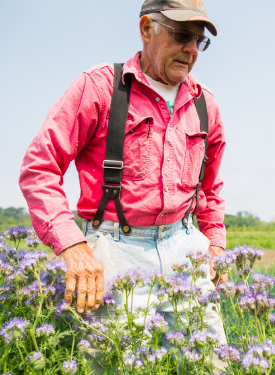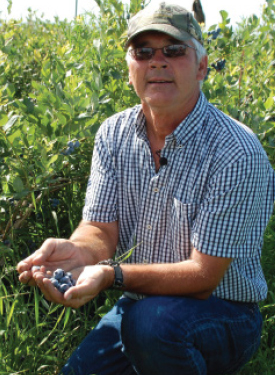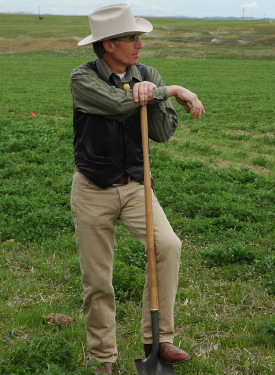Drought hurting PCC farmers
by Abra Bennett
This article was originally published in September 2015

Patty and Nash Huber. Joel Huesby. Dan Hulse. Erick Haakenson. Mark LaPierre. You may not know their names but they’re your heroes. They’re local farmers for PCC Natural Markets or PCC Farmland Trust, and they’re all in trouble from the drought.
By the time you read this, the drought either will be grinding on or, perhaps, the weather will have cut us a break. But while the shelves still were piled high with summer produce, these farmers told us their tales and all were shivering in their shoes following the hottest June on record, crushed in the grip of what Governor Jay Inslee calls “a drought unlike any we have ever experienced.”
Washington farmers get their water from two sources: snowmelt runoff to rivers, and groundwater. But there’s no snowmelt without snow and this year’s snowpack was only 16 percent of normal.
“In all the years we’ve lived here, at least 40, neither of us has ever seen the mountains completely dry,” says Patty Huber of Nash’s Organic Produce in Sequim. She and husband Nash provide PCC shoppers with carrots, leafy greens, parsnips and more. “Now we have no snow. We’ve never seen it like this.”

As Dungeness River water flows threaten to be cut off much earlier than normal, the Hubers plan to irrigate some of their 600+ acres from wells. Vegetables require irrigation and, at Nash’s, “We’ve had to reduce our vegetable production by approximately half,” says Huber. “We grow mainly fall and winter vegetables, so we put those crops in fields where they have an adequate well. We’ve been setting up more drip irrigation, purchased a new pump for one well, and even bought a 4,000-gallon tank truck so we can drive it to a field and run drip irrigation off it. If this is a climatic trend, then these are capital investments we have to make.”
Near Zillah, Washington, Mark LaPierre grows the organic blueberries, nectarines and Rainier and Lapin cherries we enjoy from PCC. He told PCC he paid more than $20,000 extra this season for propane fuel, just to pump water from his wells to water his fruit.
Joel Huesby of Huesby Farms in Walla Walla, a PCC Farmland Trust property, ran out of river water for his 380 irrigated acres by July. “In the spring and fall my water comes from the Walla Walla River but that was shut off earlier this year because there was no snowpack, and water had to be saved for the fish, so we’re using groundwater,” Huesby says. “And that water costs me four times as much as river water, just to get it up to the surface and onto the field.”
Suffering, worrying, adapting
The increased cost also is delivering a body blow to those who raise livestock, such as former PCC employee Christina Cox and her husband, Matthew, of Green Bow Farm in Kittitas Valley. Normally dependent on snowmelt to irrigate their pastures, Green Bow began the season with only half its usual water allotment, and may lose that.

“We will no longer be able to irrigate pastures for our cattle, sheep and poultry and will be forced to feed hay,” says Matthew. “Hay comes at a greater expense and reduces the quality of products because even the best hay is inferior to healthy green grass.”
“It’s a humbling year, for sure,” says Dan Hulse of Tahoma Farms, a PCC Farmland Trust farm in Orting. “As if farming weren’t difficult enough to begin with, the weather is always the biggest unknown.” Drought means “production and quality are down but prices are still high,” he adds. Indeed, Washington’s Department of Agriculture anticipates $1.2 billion in crop losses this year.
Erick Haakenson of Jubilee Biodynamic Farm, another PCC Farmland Trust farm in Carnation, says, “To be honest, the drought has me by the throat. I don’t know what the impact will end up being, but it’s very serious for us.”
Is this the new normal for our farmers? Joel Huesby gazes into the future and says, “I might get a double crop now where I’d normally never get away with it. Plant in February what I normally would plant in March. Plant crops that don’t need so much water, like milo and cow peas that came from Africa originally and are more drought-tolerant. I’m an adapter, a chameleon. You adapt or you go extinct.”
Abra Bennett is a writer living in Walla Walla.
